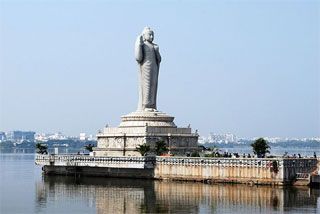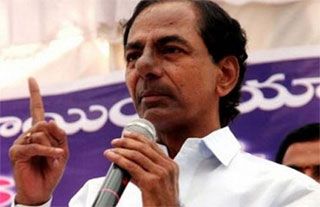All is not well with Telengana and its Chief Minister K Chandrasekhar Rao
 The new state of Telangana and also its government headed by chief minister K Chandrasekhar Rao (KCR) will complete six months on December 2. Both came into existence on June 2.
The new state of Telangana and also its government headed by chief minister K Chandrasekhar Rao (KCR) will complete six months on December 2. Both came into existence on June 2.
When he came to power, the chief minister evoked the “Golden Telangana” motif to keep the people in good humour. But the realities of life are now forcing people to judge the government by its performance on ground.
One of the recent ideas that had caught the imagination of even the Hyderabad citizens was the chief minister’s plan to build skyscrapers around the historic Hussain Sagar in the heart of the city and also of emptying the lake in summer to make it a freshwater body.
Andhra Pradesh (AP) chief minister N Chandrababu Naidu’s relentless propaganda that the new capital he would build for AP would be on a par with Singapore and Tokyo has injected an element of competition between Telangana and AP. And no one is especially impressed by KCR’s moves to keep up with the Joneses.
“AP’s task is to build a new capital, whereas we already have such a big and beautiful capital city for Telangana. KCR need not do anything on the capital city front. Instead, his priority should be to fulfil the aspirations of Telangana people that were reflected in the prolonged separate statehood movement,” says N Indrasena Reddy, former MLA and the national executive member of the Bharatiya Janata Party.
The chief minister’s plan to turn Hussain Sagar into a freshwater body, Reddy says, is just a random idea, not based on any serious thinking. To do this, the government will first need to clean up the entire catchment including the nalas that bring water into the lake before cleaning the lake bed, he said. The lake will need 1 thousand million cubic ft of fresh water after the cleaning. “Where is the water?” he asks.
 People in the villages have become quickly disenchanted with the government because it failed to save their crops from the severe power shortage in the kharif season — most of the farmers in Telangana depend on groundwater to irrigate the crops.
People in the villages have become quickly disenchanted with the government because it failed to save their crops from the severe power shortage in the kharif season — most of the farmers in Telangana depend on groundwater to irrigate the crops.
The government was able to partly succeed in re-establishing the credit cycle during the kharif season as the release of Rs 4,200 crore to the banks under the loan waiver scheme was delayed.
Opposition parties allege that the social security pensions reached only a few after the amount was enhanced to Rs 1,000 from the previous Rs 200 a month by this government. Likewise, the government was not able to introduce the modified student scholarships scheme on time, which angered the student community.
The government had given administrative sanction for Rs 15,000 crore for the development of road network and made the allocations for an ambitious water grid project that seeks to take drinking water to every village in addition to other big programmes. These programmes will certainly take time even if the government succeeds in finding the money for these projects. There are other reasons responsible for the plummeting ratings of the government, say critics.
According to the critics, the credibility gap between the words and actions of the government came into sharp focus early on. In the very beginning, the chief minister ordered a CID investigation into the “massive housing scam” allegedly carried out during the previous regimes. However, later the KCR government developed cold feet.
Similarly, it ordered the demolition of construction in one of the big colonies near the high-tech city terming them illegal, as they were built on the controversial “Gurukul Trust” lands. The demolition was stopped but the government is yet to spell out how it is going to handle the rest of the “illegal structures” in this area.
It took the government almost six months to announce the industrial policy with some built-in provisions to eliminate corruption and red tape in issuing the clearances. However, it did not bother to constitute the Pollution Control Board (PCB) and the crucial committees within the PCB that are responsible for clearing the proposals of companies. This has resulted in an unending wait for many of the applicants.
The government had announced a Rs 1-lakh-crore Budget while showing almost half of this estimated expenditure under the plan outlay. The Congress had asked the government to show the money to back these grand claims. There were no satisfactory answers available: because revenue estimates were based on future proceeds of land sale and projections of central grants that might come sometime in the future. No concrete steps were announced either in the Budget or in the Assembly on how the government proposed to increase its resources to finance its plans.
Six months of a new government in a new state can only be described as unremarkable.











